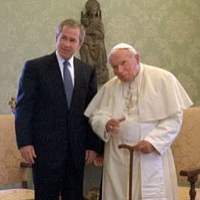![]()
Tue, Oct 12, 2010 | The Rubin Report | By Barry Rubin
Muslim Brotherhood Leader Wants A Jihadi Generation That Pursues Death
Badi’s very bad choice: the key to understanding the contemporary Middle East
When the leader of the Muslim Brotherhood–the main opposition group in Jordan and Egypt, and the most powerful Muslim group in Europe, calls for Jihad against the West, people better sit up and take notice.
A number of colleagues and writers are astonished that my story, “Muslim Brotherhood Declares War on America; Will America Notice?” hasn’t been echoed in the mass media or elsewhere. Those in Egypt know about this dramatic development by the world’s biggest Islamist group. As for the United States, my question has been answered: No, it didn’t notice.
Now the Egyptian Brotherhood’s new leader has made still another extremist sermon urging Muslims to launch Jihad, following the example of Islam’s founder, Muhammad, and in terms almost identical with Usama bin Ladin’s rhetoric. Clearly, this is a new policy that’s going to have huge consequences for Egypt, the region, and U.S. interests.
But there’s one particular sentence spoken by Supreme Guide Muhammad Badi that holds the key to understanding what’s going on now in the Middle East.
Here’s the sentence:
“The improvement and change that the [Muslim] nation seeks can only be attained through jihad and sacrifice and by raising a jihadi generation that pursues death just as the enemies pursue life.”
If you are looking at a root political cause for revolutionary Islamism here it is. (In religious terms, of course, it can be traced to basic Muslim texts. The combination of these two ingredients is what makes revolutionary Islamism so volatile and widely popular.)
But do take the time to go through this sentence’s meaning with me and I believe you will find it worthwhile. The central question for the Middle East for many decades has been this:
Why is it—especially since we are a superior people (Arabs) with a superior religion (Islam)–are we behind the West?
How that question has been answered has been the core of Middle Eastern politics. Let’s call it The Question.
From roughly around the 1880s into the 1930s, and even until the 1950s, the main answer given might be called the liberal developmentalist perspective. The West’s advances were seen as being technological, institutional, and intellectual. The distinguished historian Albert Hourani called this “the Liberal Age.”
What was needed, said the leaders, in answering The Question was to adapt and adopt Western techniques. If, for example, the Ottoman Empire or Egypt had a constitution and a multi-party parliamentary system; built up educational institutions; and created private enterprises they, too, would flourish.
These reformers, of course, made it sound too easy. Some were secular-oriented, others thought Islam could be modernized. Ironically, the latter—like Muhammad Abdu and Rashid Rida–are often seen in retrospect as pioneers of radical Islamism even though they were the opposite.
For many reasons, the liberal age failed. One chief factor was that the Arab societies were not ready for such changes and they could not easily be imposed from above. Another was the fact that authoritarian systems—like fascism in the 1920-1940 period and Communism in the 1950-2000 era–seemed more successful and attractive than moderate democracy.
Rampant corruption and extremes of class injustice were prominent as was imperial intervention (most notably in Egypt). To some extent, the failure to prevent Israel’s creation in 1948 made the existing system seem incompetent though I’d argue the fault was more due to the radical nationalists and Islamists than to the liberals. (I deal with this issue in my book, The Arab States and the Palestine Conflict.)
Yet fail the Liberal Age did and in came radical Arab nationalism. The transitional moment was July 23, 1952, when Egyptian officers overthrew the monarchy and quickly banned the multi-party system. Ever since then, radical nationalists have dominated. Their answer to the key question has been:
The reason we are behind is not mainly due to any internal failing but to the oppression of imperialism and Zionism. The solution is to have nationalist governments with dictatorial control and state domination of the economy. These regimes will fight, defeat the West, destroy Israel, bring Arab unity, and bring rapid development and prosperity.
Briefly, these regimes failed to deliver on any of their promises. They led their peoples into losing wars and generally (except for oil and gas riches) stagnant economies. These nationalist governments were generally repressive and corrupt, too, and there was much discontent. The collapse of the Soviet bloc, their main ally and model, also discredited them.
One reason for this failure is a flaw in their formulation of The Question, an error they share with the Islamists. Once you put the blame on external forces and deny the need for internal reform (less statist control, democracy, changes in the status of women, modernizing Islam, getting along with the West, making peace with Israel) you ensure that you will remain backward.
What is required to begin with is an admission of—to use William Shakespeare’s words:
“Men at some time are masters of their fates:
The fault, dear Brutus, is not in our stars,
But in ourselves, that we are underlings.”
And so here we are in the early twenty-first century with the Arab nationalist regimes under challenge by revolutionary Islamists. Though the Islamists go back as modern political organizations to the mid-1920s, they really revived in the 1980s. The Iranian revolution and the jihadist war in Afghanistan were important factors but so was the increasingly obvious failure of the nationalist regimes.
Small new liberal movements have also arisen, somewhat parallel to those of the past but putting more stress on human rights and democracy than on technology and formal institutions. Yet they are very weak. The nationalists, the existing regimes, are far more powerful than they are; so are the Islamists.
At least, though, the nationalists and their regimes are worn down by a half-century of experience and failure. For them, one might again quote from Shakespeare’s play Julius Caesar, perhaps the greatest political play of all time:
“Let me have men about me that are fat;
Sleek-headed men and such as sleep o’ nights:
Yon Cassius has a lean and hungry look;
He thinks too much: such men are dangerous.”
The nationalists are fat and sleek; the Islamists lean and hungry.
Many in the West answer as Mark Antony did to Caesar, “Fear him not, Caesar; he’s not dangerous.”
But Caesar is smarter. He knows Cassius is a fanatic, a man who cannot be bought off by flattery or presents, who is single-mindedly focused. So he explains:
“He loves no plays…he hears no music;
Seldom he smiles, and smiles in such a sort
As if he mock[e]d himself and scorn[e]d his spirit
That could be moved to smile at any thing.
Such men as he be never at heart’s ease
While they behold a greater than themselves,
And therefore are they very dangerous.”
And so are the Islamists. So how do the Islamists deal with The Question? By saying:
The reason we are behind is not mainly due to any internal failing but to the oppression of imperialism and Zionism, the treason of our governments, and above all our abandonment of Islam. The solution is to have proper Islamic governments with dictatorial control, state domination of the economy, unity through a new caliphate, the systematic rejection of Western culture and non-technological ideas, and making our society conform to Islamic law as we interpret it. These regimes will fight, defeat the West, destroy Israel, bring Muslim unity, and fulfill Allah’s commands.
And here is where Badi’s statement fits in as the proposed solution:
“The improvement and change that the [Muslim] nation seeks can only be attained through jihad and sacrifice and by raising a jihadi generation that pursues death just as the enemies pursue life.”
Not through solving problems by compromise; not by ending foreign conflicts; not by better educational systems that are open to science and other imported ideas; not by modernizing Islam; not by granting equality to women; not by democracy; not by human rights. No and no and no. But only by:
“…jihad and sacrifice and by raising a jihadi generation that pursues death just as the enemies pursue life.”
Jihad they want and Jihad they will get; death they want and death they will get; a generation of warfare they want and a generation of warfare they will get. They will fail and their claims seen to be hollow. Unfortunately, it will take about fifty years for that to happen. The result? Arab and Muslim-majority countries will be left even further behind the rest of the world.
About the author,
Barry Rubin is director of the Global Research in International Affairs (GLORIA) Center and editor of the Middle East Review of International Affairs (MERIA) Journal. His latest books are The Israel-Arab Reader (seventh edition), The Long War for Freedom: The Arab Struggle for Democracy in the Middle East (Wiley), and The Truth About Syria (Palgrave-Macmillan). For the website of the GLORIA Center go here and for his blog, Rubin Reports, go here.



 RSS
RSS











Muslim Brotherhood Leader Wants A Jihadi Generation That Pursues Death | #Egypt #Muslim #Brotherhood #Jihad #Badi #Islam http://j.mp/dxn7Kv
Lees en huiver: #Muslim #Brotherhood Leader Wants A #Jihadi Generation That Pursues Death!
#Islam http://j.mp/dxn7Kv
RT @Keelklank: Lees en huiver: #Muslim #Brotherhood Leader Wants A #Jihadi Generation That Pursues Death!
#Islam http://j.mp/dxn7Kv
RT @Keelklank: Lees en huiver: #Muslim #Brotherhood Leader Wants A #Jihadi Generation That Pursues Death!
#Islam http://j.mp/dxn7Kv